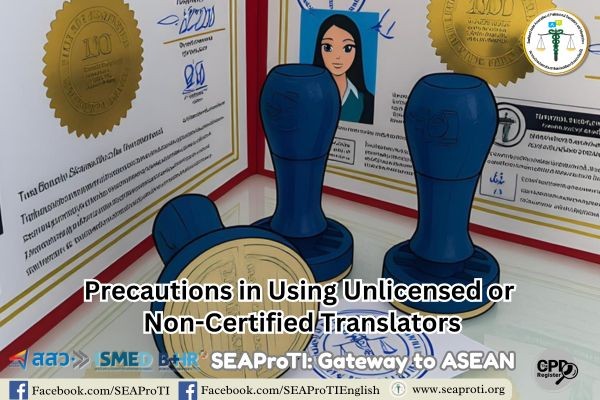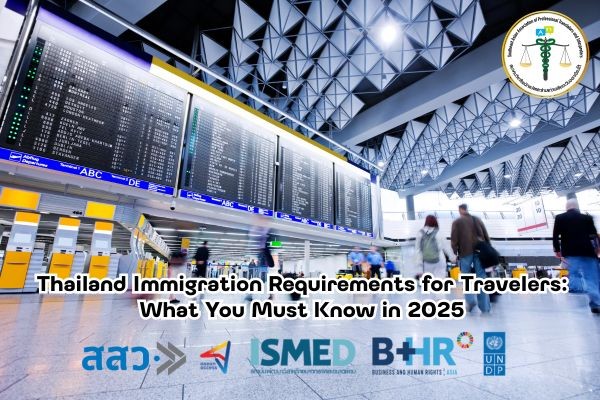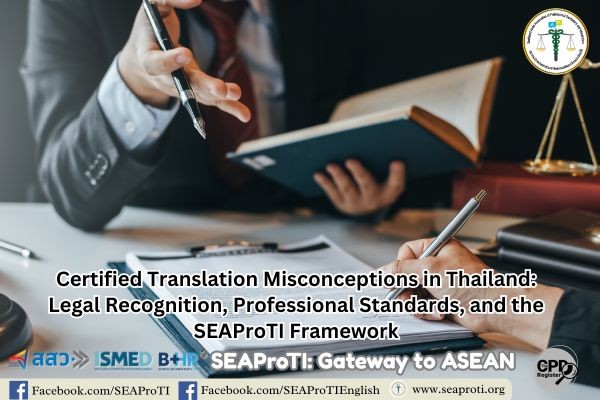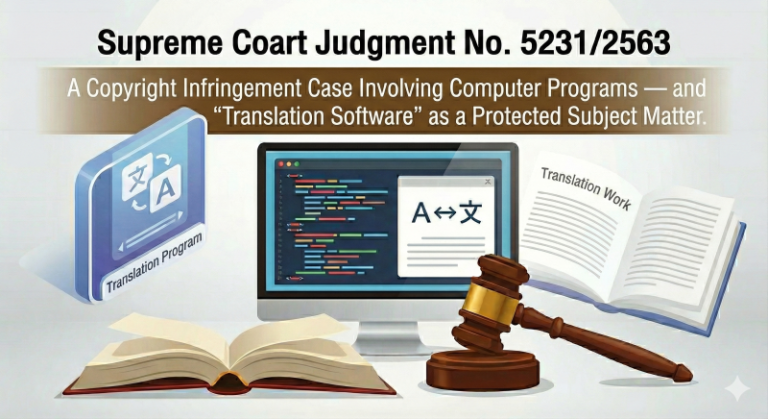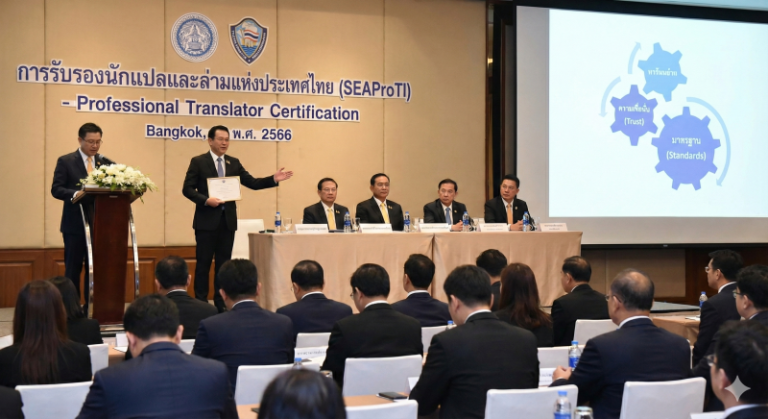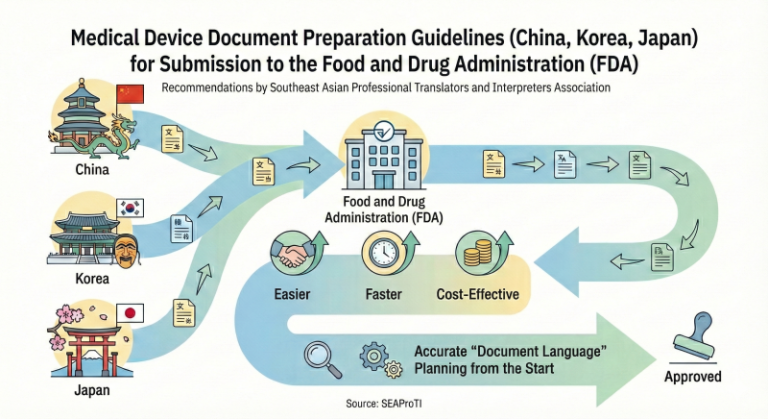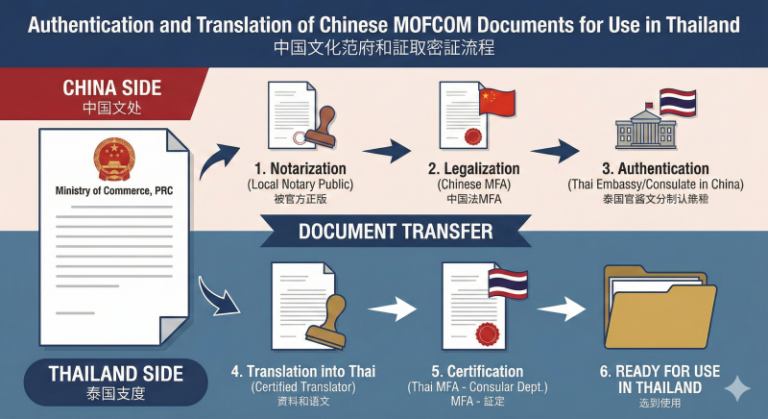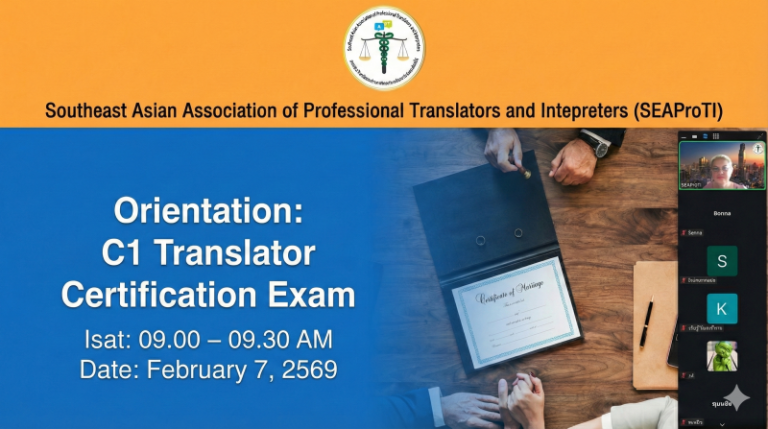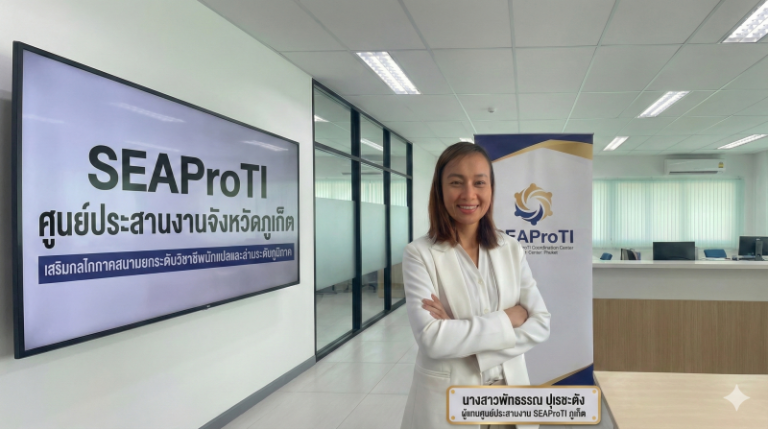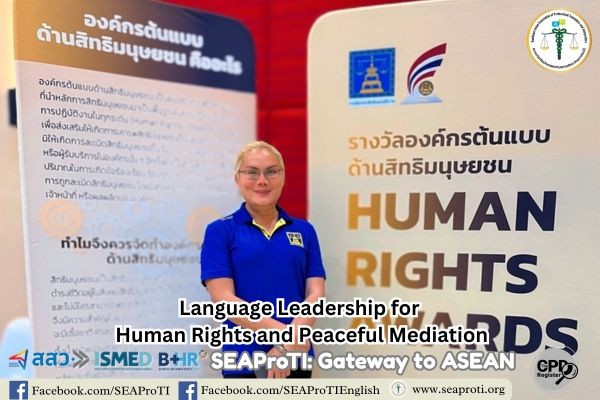Precautions in Using Unlicensed or Non-Certified Translators
19 October 2025, Bangkok – This article examines the legal, ethical, and reputational risks associated with the use of unlicensed or non-certified translators, particularly in Thailand and the Southeast Asian context. Translators without professional accreditation—such as certification from the Southeast Asian Association of Professional Translators and Interpreters (SEAProTI)—often lack verified competence, accountability, and compliance with ethical standards. Their work can result in inaccuracies, data breaches, or rejection of translated documents by government agencies and foreign authorities. This paper highlights the need for professional certification, outlines key areas of risk, and proposes guidelines for the responsible selection of translation services.
Translation plays a vital role in legal, governmental, academic, and international business communication. Errors in translation can lead to serious consequences affecting rights, contracts, and reputations (Munday, 2022). In Thailand, while many individuals offer translation services, only a fraction hold professional certification from recognized bodies such as SEAProTI, which operates a peer certification system based on competence, ethics, and accountability (SEAProTI, 2023).
Using unlicensed translators—those who have not been verified by a professional body—poses significant risks that organizations and individuals must carefully consider.
Translations used in court proceedings, administrative procedures, or international transactions must be legally accurate. A single mistranslation by an unlicensed translator can render a document invalid or inadmissible before authorities (Hale, 2019).
Absence of Professional Standards
Non-certified translators have not undergone formal competence assessment or continuing professional development (CPD) and often lack awareness of key professional principles such as:
Confidentiality of information
- Terminological accuracy
- Faithful transfer of meaning without distortion
Reputational Risks for Organizations
Organizations that hire unlicensed translators without verification may suffer reputational damage, especially when dealing with sensitive or high-value documents such as international contracts, legal pleadings, or official correspondence.
Data Confidentiality Risks
Unlicensed translators are not bound by the professional ethical codes of recognized associations and may mishandle sensitive client information. Unauthorized disclosure of personal or corporate data—such as passport details, financial records, or legal documents—can constitute a violation of Thailand’s Personal Data Protection Act (PDPA), which carries both civil and criminal penalties (Chantavanich, 2023).
Foreign institutions such as embassies, courts, and universities generally accept only translations produced by certified translators accredited by recognized professional bodies such as SEAProTI, CIOL (UK), ATA (US), or NAATI (Australia).
To mitigate the above risks, the following precautions are recommended:
- Verify the translator’s license through the SEAProTI database before engagement.
- Select translators with active certification and recent CPD records.
- Use formal written contracts defining confidentiality and liability terms.
- Avoid anonymous online platforms or agencies without verifiable credentials.
- Such preventive measures not only ensure compliance but also protect both clients and translators from professional and legal disputes.
Hiring unlicensed translators may appear cost-effective but often results in serious legal, ethical, and reputational risks. Certified translators, on the other hand, guarantee linguistic accuracy, confidentiality, and international recognition. Employing professionals certified by SEAProTI or equivalent organizations is therefore not merely a matter of preference—it is a fundamental safeguard of justice, reliability, and professional integrity in cross-lingual communication.
References
- Chantavanich, S. (2023). Legal framework and ethical implications of data protection in Thailand. Bangkok: Thammasat University Press.
- Gile, D. (2009). Basic concepts and models for interpreter and translator training (Rev. ed.). Amsterdam: John Benjamins.
- Hale, S. (2019). The discourse of court interpreting: Discourse practices of the law, the witness and the interpreter. Amsterdam: John Benjamins.
- Munday, J. (2022). Introducing translation studies: Theories and applications (5th ed.). London: Routledge.
- SEAProTI. (2023). Professional charter and peer certification framework. Bangkok: Southeast Asian Association of Professional Translators and Interpreters.
- SEAProTI. (2024). Code of ethics and accreditation standards for translators. Bangkok: Southeast Asian Association of Professional Translators and Interpreters.
The Southeast Asian Association of Professional Translators and Interpreters (SEAProTI) has formally announced the qualifications and requirements for registration of Certified Translators, Translation Certification Providers, and Certified Interpreters in Sections 9 and 10 of the Royal Gazette, published by the Secretariat of the Cabinet, Office of the Prime Minister of Thailand, on 25 July 2024 (Vol. 141, Part 66 Ng, p. 100). Certified Translators, Translation Certification Providers, and Certified Interpreters
The Council of State has proposed the enactment of a Royal Decree, granting registered translators and recognized translation certifiers from professional associations or accredited language institutions the authority to provide legally valid translation certification (Letter to SEAProTI dated April 28, 2025)
SEAProTI is the first professional association in Thailand and Southeast Asia to implement a comprehensive certification system for translators, certifiers, and interpreters.
Head Office: Baan Ratchakru Building, No. 33, Room 402, Soi Phahonyothin 5, Phahonyothin Road, Phaya Thai District, Bangkok 10400, Thailand
Email: hello@seaproti.com | Tel.: (+66) 2-114-3128 (Office hours: Mon–Fri, 09:00–17:00)
สิ่งที่ต้องระมัดระวังในการใช้นักแปลทั่วไปและไม่มีใบอนุญาต
ในประเทศไทย แม้จะมีผู้ให้บริการแปลจำนวนมาก แต่ยังมีเพียงบางส่วนเท่านั้นที่ผ่านการรับรองจากสมาคมวิชาชีพ เช่น SEAProTI ซึ่งมีระบบ Peer Certification และเกณฑ์จรรยาบรรณที่เข้มงวด (SEAProTI, 2023)
การใช้นักแปลที่ไม่มีใบอนุญาตจึงเป็นความเสี่ยงที่ทั้งบุคคลและองค์กรควรตระหนัก
ความเสี่ยงทางกฎหมาย (Legal Risks)
เอกสารแปลที่ใช้ในราชการ ศาล หรือการทำธุรกรรมระหว่างประเทศ ต้องมีความถูกต้องตามกฎหมาย หากนักแปลไม่มีใบอนุญาตและแปลผิดแม้เพียงคำเดียว อาจส่งผลให้เอกสาร เป็นโมฆะ (void) หรือไม่สามารถใช้ได้ในทางราชการ (Hale, 2019)
ตัวอย่างเช่น การแปลหนังสือรับรองบริษัท ใบมรณบัตร หรือคำพิพากษา หากแปลไม่ตรงกับต้นฉบับ ศาลต่างประเทศอาจปฏิเสธเอกสาร และกระทบต่อผลคดีโดยตรง
นักแปลทั่วไปที่ไม่มีใบอนุญาตมักไม่ได้ผ่านการทดสอบสมรรถนะหรือการอบรมต่อเนื่อง (CPD) และอาจไม่เข้าใจหลักเกณฑ์สำคัญ เช่น
- การรักษาความลับของข้อมูล (Confidentiality)
- การใช้คำศัพท์เฉพาะทาง (Terminological Accuracy)
- การถ่ายทอดความหมายโดยไม่บิดเบือน (Faithfulness)
ความเสี่ยงต่อความน่าเชื่อถือขององค์กร (Reputational Risks)
- องค์กรที่เลือกใช้นักแปลทั่วไปโดยไม่ตรวจสอบใบอนุญาต อาจสูญเสียความน่าเชื่อถือเมื่อเกิดข้อผิดพลาดทางภาษาในเอกสารสำคัญ เช่น สัญญาทางธุรกิจ จดหมายระหว่างประเทศ หรือรายงานทางกฎหมาย
- ในกรณีของการสื่อสารระหว่างประเทศ ความผิดพลาดเพียงเล็กน้อยอาจถูกตีความว่าเป็น การละเมิดเจตนารมณ์ของข้อตกลง (misrepresentation) ซึ่งอาจนำไปสู่ข้อพิพาททางกฎหมายได้ (Gile, 2009)
การละเมิดข้อมูลส่วนบุคคล (Data Confidentiality Risks)
นักแปลที่ไม่มีใบอนุญาตไม่ได้อยู่ภายใต้จรรยาบรรณของสมาคมวิชาชีพ จึงไม่มีข้อผูกพันทางกฎหมายในการปกป้องข้อมูลของลูกค้า
หากมีการรั่วไหลของข้อมูลส่วนบุคคล เช่น หมายเลขหนังสือเดินทาง เอกสารทรัพย์สิน หรือคำฟ้องในคดีความ อาจเข้าข่ายละเมิดกฎหมายคุ้มครองข้อมูลส่วนบุคคล (Personal Data Protection Act: PDPA) ซึ่งมีโทษทั้งทางแพ่งและอาญา (Chantavanich, 2023)
- หน่วยงานต่างประเทศ เช่น สถานทูต ศาล หรือมหาวิทยาลัย มักยอมรับเฉพาะเอกสารที่แปลโดยนักแปลที่มีใบอนุญาตจากองค์กรวิชาชีพ เช่น SEAProTI, CIOL (UK), ATA (US) หรือ NAATI (Australia)
- เอกสารที่แปลโดยนักแปลทั่วไป แม้จะมีการรับรองลายเซ็นจากกระทรวงการต่างประเทศ ก็ยังอาจ ถูกปฏิเสธโดยศาลต่างประเทศ เนื่องจากขาดการรับรองคุณสมบัติของผู้แปล (SEAProTI, 2024)
- ตรวจสอบใบอนุญาตของนักแปลกับฐานข้อมูลของ SEAProTI ก่อนว่าจ้าง
- เลือกนักแปลที่มีการต่ออายุใบอนุญาตและผ่านการอบรม CPD ล่าสุด
- ทำสัญญาจ้างเป็นลายลักษณ์อักษร โดยระบุขอบเขตความรับผิดชอบและการรักษาความลับ
- หลีกเลี่ยงการว่าจ้างผ่านช่องทางออนไลน์ที่ไม่ระบุชื่อหรือที่อยู่ชัดเจน
การใช้นักแปลทั่วไปที่ไม่มีใบอนุญาตอาจดูเหมือนเป็นทางเลือกที่ประหยัด แต่ในความเป็นจริงกลับสร้างความเสี่ยงทางกฎหมาย จรรยาบรรณ และชื่อเสียงอย่างร้ายแรง การเลือกใช้บริการนักแปลที่ได้รับการรับรองจากสมาคมวิชาชีพ เช่น SEAProTI จึงเป็นการรับประกันคุณภาพ ความน่าเชื่อถือ และการยอมรับในระดับสากล
เอกสารอ้างอิง (References)
- Chantavanich, S. (2023). Legal framework and ethical implications of data protection in Thailand. Bangkok: Thammasat University Press.
- Gile, D. (2009). Basic concepts and models for interpreter and translator training (Rev. ed.). Amsterdam: John Benjamins.
- Hale, S. (2019). The discourse of court interpreting: Discourse practices of the law, the witness and the interpreter. Amsterdam: John Benjamins.
- Munday, J. (2022). Introducing translation studies: Theories and applications (5th ed.). London: Routledge.
- SEAProTI. (2023). Professional charter and peer certification framework. Bangkok: Southeast Asian Association of Professional Translators and Interpreters.
- SEAProTI. (2024). Code of ethics and accreditation standards for translators. Bangkok: Southeast Asian Association of Professional Translators and Interpreters.
สมาคมวิชาชีพนักแปลและล่ามแห่งเอเชียตะวันออกเฉียงใต้ (SEAProTI) ได้ประกาศหลักเกณฑ์และคุณสมบัติผู้ที่ขึ้นทะเบียนเป็น “นักแปลรับรอง (Certified Translators) และผู้รับรองการแปล (Translation Certification Providers) และล่ามรับรอง (Certified Interpreters)” ของสมาคม หมวดที่ 9 และหมวดที่ 10 ในราชกิจจานุเบกษา ของสำนักเลขาธิการคณะรัฐมนตรี ในสำนักนายกรัฐมนตรี แห่งราชอาณาจักรไทย ลงวันที่ 25 ก.ค. 2567 เล่มที่ 141 ตอนที่ 66 ง หน้า 100 อ่านฉบับเต็มได้ที่: นักแปลรับรอง ผู้รับรองการแปล และล่ามรับรอง
สำนักคณะกรรมการกฤษฎีกาเสนอให้ตราเป็นพระราชกฤษฎีกา โดยกำหนดให้นักแปลที่ขึ้นทะเบียน รวมถึงผู้รับรองการแปลจากสมาคมวิชาชีพหรือสถาบันสอนภาษาที่มีการอบรมและขึ้นทะเบียน สามารถรับรองคำแปลได้ (จดหมายถึงสมาคม SEAProTI ลงวันที่ 28 เม.ย. 2568)
สมาคมวิชาชีพนักแปลและล่ามแห่งเอเชียตะวันออกเฉียงใต้ เป็นสมาคมวิชาชีพแห่งแรกในประเทศไทยและภูมิภาคเอเชียตะวันออกเฉียงใต้ที่มีระบบรับรองนักแปลรับรอง ผู้รับรองการแปล และล่ามรับรอง
สำนักงานใหญ่: อาคารบ้านราชครู เลขที่ 33 ห้อง 402 ซอยพหลโยธิน 5 ถนนพหลโยธิน แขวงพญาไท เขตพญาไท กรุงเทพมหานคร 10400 ประเทศไทย
อีเมล: hello@seaproti.com โทรศัพท์: (+66) 2-114-3128 (เวลาทำการ: วันจันทร์–วันศุกร์ เวลา 09.00–17.00 น.)


